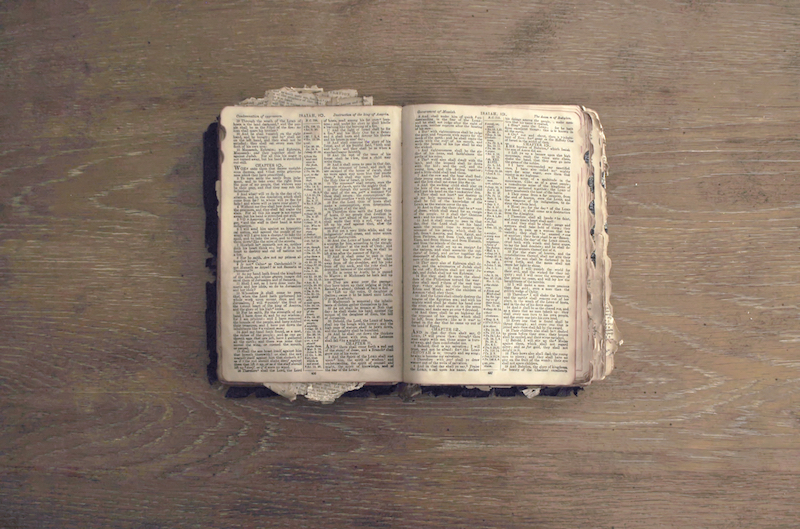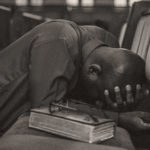Jonathan Edwards is well-known, sometimes notoriously so, for the copious amounts of time he spent studying. His student and friend Samuel Hopkins said Edwards “commonly spent 13 hours every day in his study.” Historians have sometimes used this to argue Edwards neglected other duties. This is questionable, though, since it doesn’t seem to adequately explain how many close to him saw things quite differently, nor does it account for his tender relationship with his wife. Plus, Edwards often shared his study with family, friends, and parishioners. Debates aside, what Edwards’s study time does point to is the man’s deep love for Scripture.
Edwards’s wonder and passion for the Bible got him up before sunrise almost each day of the year (between 4 and 5 a.m.). Hopkins once remarked of his priorities:
He studied the Bible more than all other books, and more than most other divines do. . . . He took his religious principles from the Bible, and not from any human system or body of divinity.
Edwards vowed in his “Resolutions” while a boy in his late teens that he would:
Study the Scriptures so steadily, constantly and frequently, as that I may find, and plainly perceive myself to grow in the knowledge of the same.
Indeed, Edwards devoted most of his waking life to studying Scripture, its extrabiblical contexts, its theological meanings, and its import for everyday religion. And he did this because he believed the Bible was unique.
Our Basic Framework
Despite appearing a backward-looking thinker to some, Edwards surely would’ve jumped at the chance to live with us today. He would’ve given almost anything for access to the historical and scientific knowledge that has burgeoned so dramatically since the early 19th century. His 18th-century world seems far away, a distant land. And Edwards was a man of his times. But he was also keenly curious and usually open-minded. He was a forward-looking thinker with an insatiable appetite for information about the Bible, its ancient historical contexts, and the structure of the natural world in which its events, stories, songs, poems, prophecies, morals, and other teachings were—and continued to be—realized. Edwards saw great value in the expanse of extrabiblical learning.
Yet the truth remains that biblical knowledge was supremely important to him because it was foundational to reality. He thought the Word of God was that by which the entire world—sacred and secular—was sustained and cohered ontologically. Its record in the Bible was God’s speech in writing, our most basic, proper, and helpful frame of reference for interpreting all else.

“The Bible is full of wonderful things,” Edwards attested to his people. It has stood the test of time as the world’s “most comprehensive book.” It is “divine.” It is “unerring.” The splendid light it sheds on our world “is ten thousand times better than [that] of the sun.” The Scripture’s sacred texts, Edwards contended, are “the most excellent things in the world.” In fact, they tower “as much above those things” we study “in other sciences, as heaven is above . . . earth.”
Further, the knowledge held in these heavenly texts is “infinitely more useful and important” than the knowledge attained in “all other sciences.” Edwards lauded Scripture as a “great” and “precious treasure.” He pleaded with his congregations to “search for” biblical treasure, with “the same diligence . . . with which men . . . dig in mines” for gold.
Because it supplies truth from God, the Bible provides the basic framework for understanding life and the world.
Inexhaustible Treasure Trove
Scripture thrilled Edwards. And he encouraged a similar devotion in the people he served. He assured his congregations that biblical learning was for all, not just clergy and “men of learning, but . . . persons of every character.” God calls everyone to hunt the treasure hid in Scripture, both the “learned and unlearned, young and old, men and women.”
Not even the brightest Bible scholar will begin to find it all. In fact, the ones who “studied the longest, and have made the greatest attainments . . . know but little of what is to be known.” The Bible’s “subject is inexhaustible,” for God “is infinite, and there is no end to the glory of his perfections.” Consequently, all should apply their hearts and minds to Holy Scripture, making the study of its books “a great part of the business of our lives.” Edwards drove this point home by recommending his people give as much of their time to seeking the things of God as seeking mammon:
Content not yourselves with having so much knowledge as is thrown in your way, and as you receive in some sense unavoidably by the frequent . . . preaching of the word, of which you are obliged to be hearers, or as you accidentally gain in conversation; but let it be very much your business to search for it, and that with the same diligence and labor with which men are wont to dig in mines of . . . gold.
We may not be able to spend 13 hours a day in God’s Word as Edwards did, yet his warning remains true:
He that has a Bible, and don’t observe what is contained [in] it, is like a man that has a box full of silver and gold, and don’t know it, don’t observe that it is anything more than a vessel filled with common stones. As long as it is thus with him, he’ll be never the better for his treasure.
Our technological and consumerist age surely needs Edwards’s warning as much or more than his own day. May we see the Word as the treasure it is, and may we be indefatigable learners and doers of it.
Editors’ note: This article is adapted from Douglas Sweeney’s latest book, Edwards the Exegete: Biblical Interpretation and Anglo-Protestant Culture on the Edge of the Enlightenment (Oxford University Press, 2016).
Is there enough evidence for us to believe the Gospels?
 In an age of faith deconstruction and skepticism about the Bible’s authority, it’s common to hear claims that the Gospels are unreliable propaganda. And if the Gospels are shown to be historically unreliable, the whole foundation of Christianity begins to crumble.
In an age of faith deconstruction and skepticism about the Bible’s authority, it’s common to hear claims that the Gospels are unreliable propaganda. And if the Gospels are shown to be historically unreliable, the whole foundation of Christianity begins to crumble.



































